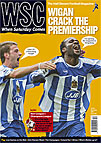 Four goals in his first nine Cardiff games have revived the stock of a player who had seemed to be just a momentary over-achiever. Helen Duff investigates
Four goals in his first nine Cardiff games have revived the stock of a player who had seemed to be just a momentary over-achiever. Helen Duff investigates
Sod’s law: it’s never the players we want to hear more from who develop a taste for confession. Most of us could die happy if we never had to read any more of David Beckham’s over-publicised disclosures, but – conversely – would love to know what goes on inside the heads of those whose form is so bafflingly inconsistent it must have a root in their psyches.
Look at Michael Ricketts, for instance. Cardiff City fans might be happy to take the 26-year-old’s form on face value – since arriving at the end of summer, he’s netted with frequency and wallop – but supporters of Leeds United, from whom he’s on loan, could be forgiven for wanting to rope him to a chair, shine a 100 watt bulb in his eyes and shriek: “So how come you’re decent for them when you’ve been bobbins for us, you great lump?”
Queuing up to join in the interrogation would be similarly unsatisfied supporters of Middlesbrough, Stoke and England, while waiting in the background – feigning indifference but secretly agonising “Why, Michael, why?” in the style of jilted lovers – would be representatives of both Bolton Wanderers and Walsall. Studying Ricketts’ statistics just compounds the confusion – plotted as a graph, his career resembles Pinocchio’s polygraph test.
As a trainee at Walsall, the Birmingham-born striker gave no hint of his later fondness for alternately inspiring and dashing high hopes. Instead, his record over four years for the Saddlers was one of middling success as a powerful but sometimes cumbersome forward. With opinion split over whether he was gifted, idle, moody or all three, he broke few hearts when he signed for Bolton for a modest £400,000 in the 2000 close season. Nor did he shine instantly at the Reebok. Sam Allardyce must have seen something special in the player’s style, but it was revealed only by degrees: in fact, it became so routine for Ricketts to come on only at the end of a match that, in parallel to his growing reputation as a “super sub”, rumours flourished among fans that a heart condition prevented him from playing 90 minutes.
Mythical maladies aside, after he helped Bolton win promotion to the Premiership in 2001, few spectators doubted that this was a skilled player who had finally come out of his shell. Scoring a dozen times in the first half of the 2001-02 season, he inspired proud chants of “We’ve got Ricketts!” – a cry previously heard in Lancashire only in plaintive response to the county’s lack of sunshine.
But if he helped forge Allardyce’s reputation for extracting form from recalcitrant players, Ricketts also dealt it a blow. As suddenly as he had erupted, he subsided – the speed, power and timing he had previously exhibited in defence-splitting gallops replaced by slumbering, lumbering advances on goal that suggested he’d lost heart.
Not everyone noticed the slump straight away. In belated response to a media campaign, Sven-Göran Eriksson fielded Ricketts for 45 minutes of a Holland v England friendly in February 2002. The player failed to shine and wasn’t picked for his country again.
But – despite a fallout with Allardyce that either caused or was caused by his detectable change of attitude – Ricketts still had fans. Unwilling to stay at Bolton, he flirted with Spurs in January 2003 before agreeing terms with Middlesbrough – his fee of £3.5 million fair exchange, Steve McClaren reckoned, for a player who could twin size and pace.
What followed was protracted anti-climax. Despite almost relegating his former club with a goal against Bolton on the final day of the 2003 season and picking up a Carling Cup winners’ medal (again versus Wanderers), Ricketts made minimal impact at Boro. He did nothing to aid McClaren’s shaky signings record and established an image as the poor man’s Emile Heskey. A free transfer to relegated Leeds came in 2004, but even one division down he failed to find his feet. After a lacklustre loan spell at Stoke, the jury had seemingly reached its conclusion: Ricketts was a one-cap wonder, weighty but unwieldy, who, whether due to self-belief or good coaching, had temporarily overachieved.
Now, after his early success at Ninian Park, the verdict looks less definite. Undoubtedly temperamental, might Ricketts be a victim of his own sensitivity, who just needs tender management to flourish? A shrink – or some Beckham-style disclosures from Michael himself – might be able to tell us. In the meantime, all that’s clear to the mystified observer is that, in Ricketts’ case, “career” is a verb.
From WSC 226 December 2005. What was happening this month